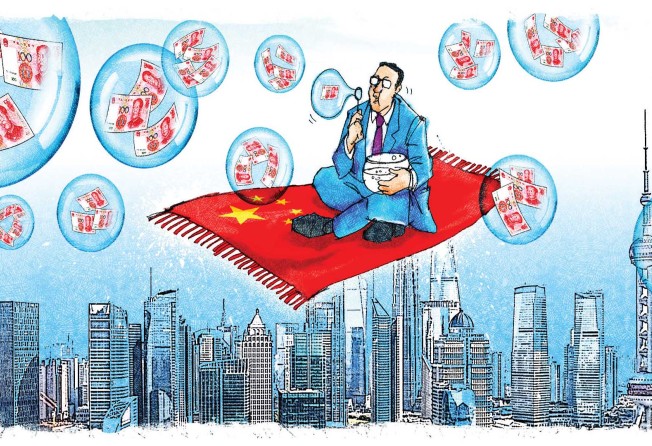Neither devaluation nor another stock market bubble can promote China's economic health
Andy Xie says China's misguided stock market bailout is only delaying the inevitable: critical reforms

Has Beijing's stock market rescue been a success? The market hasn't fallen below the pre-bailout lows and some may call this a success. But it hasn't revived speculative fervour. Every attempt to ramp up the market has been punctured by a mini crash.
The 70 per cent reduction in trading volume indicates that most investors are waiting for the government to push up the market to the said target of 4,500 and then cash out. When so many think like this, the market will never get there.
The bailout is mostly a confidence game. There is no transparency about how much money the government has actually poured in. Some measures may make a little difference to the supply- demand balance. For example, stockbrokers have been banned from selling their inventories before the market hits 4,500. But is that a large amount? State-owned enterprises have been asked to buy back shares. Again, the tidbits on the buybacks indicate tiny amounts relative to the market size.
The most significant move has probably been the suspending of margin calls. As margin loans may have accounted for a third of the floating shares at the peak, a total ban could be a big deal. But it's unclear as to who still falls under the restrictions. Stockbrokers have been cutting their margin loans. For the numerous outside players who provide top-up margin loans, there is no transparency about who is still restricted. Chances are, most margin loan suppliers are selling. They are holding back in many cases because they are under water; they are waiting for the government to push the market above their cost to liquidate.
The government rescue efforts have manufactured hope for speculators and lenders that they could be made whole again. The hope game can't last forever. At some point, they will liquidate to cut their losses. When this tipping point is reached, no government efforts could stop the collapse. In 2008, when the market dropped by half, similar government efforts kept the market range-bound for several months. The final collapse cut the market index by another half. This time could be quite similar.
When the market began to surge in the middle of last year, the index was near 2,000 for a long time. After a 150 per cent surge in 12 months, the economic fundamentals deteriorated sharply, and the market was saddled with mountains of debt. This combination suggests the market will eventually fall below where it came from.
As the government stakes so much on propping up the stock market, it begs the question: why? The stock market has not raised that much money relative to the investment size. It has surged and collapsed many times before with no big impact on the economy either way. The difference this time is that a stock market boom was sold as the panacea to solve all economic ills: distressed companies could raise money to stay afloat; youths would be motivated to start businesses to cash out in the market; and retail investors would feel rich and spend more. The market collapse puts an end to such fantasy economics. And there is no plan B.
What's not real will never become so; no amount of propaganda can change that. People can suspend their belief only for a short period of time. Gravity always comes back. China's experiment with fantasy economics is a costly lesson. It has wasted precious time for real reforms and ruined another generation in the stock market.
China is in the midst of serious debt deflation. Massive debt-funded investment has engulfed the economy since 2008. It was justified on the grounds of shoring up the economy during the global financial crisis. When the global economy recovered, the built capacities could be utilised. Unfortunately, the expected demand boom hasn't come. Instead, investment demand has been sustained to keep factories occupied - that is, building more capacity to keep the existing capacity occupied. The end to such a story is always deflation and bad loans.
A new bubble like that in the stock market can never be a proper tool to handle the consequences of an old one. The only path forward is to cut excess capacity, handle the resulting bad loans, and massively cut taxes to rebalance the economy.
Devaluation has been marketed as necessary for boosting the economy but the real motivation is to create room for printing money to bail out speculators. At best, this will buy time to delay the necessary reforms, but it will create a bigger problem for the future. At worst, it could trigger a confidence crisis and massive capital flight, repeating the mistake that Indonesia made in 1998.
Beijing's devaluation is a trial to see how the world will react. If there are no strong responses from the market or the US government, a big devaluation may well be coming. One likely consequence is that the US Congress could pass a protectionist bill with a punitive tariff to match the devaluation. While China could go to the World Trade Organisation, it would be a long time before a judgment was rendered and, even if favourable, it would be too late to help.
Reform, not devaluation, or a new bubble, is the only viable path forward.
Andy Xie is an independent economist